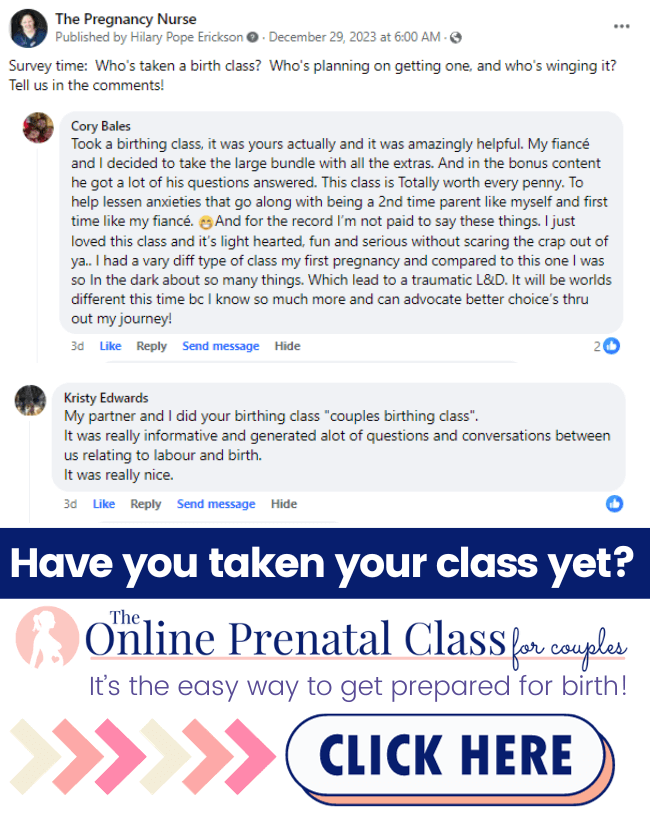👋 I’m so glad YOU are here. Are you looking to also get your partner prepared? This is for BOTH of you. Couples just love it and I know you want to both feel prepared!
You may be really worried about being sent home from the hospital when you think you’re in labor. You might be embarrassed by going for “no reason” or just the hassle of going there without the outcome that you want. All of those are normal, and I want you to know what to expect in this situation!

But first, how do I know all of this? Hi — I’m Hilary — The Pregnancy Nurse 👩⚕️. I have been a nurse since 1997 and I have 20 years of OB nursing experience, I am also the curly head behind Pulling Curls and The Online Prenatal Class for Couples. 🩺 I have triaged thousands of patients for many things, but most often labor. I have helped them understand when to come back — so I think I’m an expert in this area!
This can be a very confusing situation, but I can’t recommend any stronger that you get a prenatal class in. So often your own anxiety can be keeping you from going into labor, and feeling more prepared is just the “missing piece” towards getting that baby out! This one can be done i just a few hours and can include your partner if you’d like!
What Happens When You Go to the Hospital in Labor?
When you go into labor you’re assessed by a “triage” nurse who helps the doctor make the decision if you are admitted, or if they send you home. Here is what to expect if you go into the triage department:
You’ll direct you to a triage area (or sometimes a regular labor room depending on how the hospital is set-up or working that day)
You’ll get into a gown so the nurse can assess you (although not required, if you are in street clothes it makes it easier for them to listen to your heart and lungs and possibly check your cervix).
Admitting will get your information for billing purposes (they can’t delay you being assessed by a provider when you are not “stable” — and if you think you’re in labor you’re not “medically stable” — but they can come to the room to get the information)

The nurse get your baby on the monitor first thing — this is one of their highest priorities when you present to labor and delivery. She will also get a few sets of vital signs (blood pressure, heart rate, respirations oxygenation and temperature).
The nurse will then ask you a million questions. The most important one will be: What brought you in today? You’ll want to have an answer. Mot people respond with something like this:
I have been having contractions at home the last 3 hours. They are getting more painful and are about 3 minutes apart now. I think I’m in labor.
It’s also a good time to include other things that you’re experiencing like GI distress, changes in discharge (or if you think your water is broken).
Labor doesn’t normally come “alone” and it’s a positive sign to see other signs of labor. A lot of people say “no one ever told me” about those other signs of labor, so I think this is VERY helpful!
At some point in this she will check your cervix. If a patient looks very uncomfortable they may check you sooner, and if you seem more comfortable they may watch your contractions before checking your cervix.
While all the other signs are amazing, that cervical exam is one of the most telling things as to if you will stay or go.
She may also check to see if your water is broken, and check any other issues you are having.
Once she has the information she needs she will call your provider. Ultimately, it is your doctor or midwife’s order which has you stay or sends you home.
Their order will be based on:
- Your cervical exam results
- How the baby looks on the monitor
- How frequent your contractions are
- What # of baby it is
- If your vital signs are OK
- Any other issues you’re having (aka like a bladder infection, etc)
Sometimes the order is directly to admit (like, if you’re around 5 centimeters or more — or your water is broken).
Sometimes the order is to get some lab work done — like, if your blood pressure is high or if they think you have other medical issues going on.
Sometimes the order is to check your cervix again in about an hour while keeping an eye on contractions. If you’re still in early labor, they want to be sure that your cervix is progressing fast enough that the hospital is the best place for you.
Either way, they will be sure that you and baby are doing alright and how far into your labor you are. This is in no way a crystal ball of how things will be in an hour or two. Sometimes people kick into very fast active labor and will start to dilate quickly, and some people’s contractions will stop and they will be pregnant for a few more days.
Will I see a doctor/midwife during my stay?
Depending on the hospital’s policies you may or may not see a doctor during your visit.
In many hospitals the nurses are trained to assess for specific things (like labor, UTI, preterm labor etc.) and if your issue falls outside those boundaries you do need to see a doctor. That may be a doctor in the ER (like, if you come in for cold/flu symptoms) or it a doctor or midwife.
Nurses are VERY good at knowing what is normal, and they are quick to alarm to providers if they see anything unusual. Also, most often a nurse isn’t allowed to triage patients until she has been a labor nurse for a couple of years. Many hospitals also require that you take a class to do triage so they can be sure you are competant.
If you don’t feel comfortable with the nurse’s assessment of you, you can ask to speak with the charge nurse to see if they agree with the nurse’s plan.
Why Would They Send You Home?
They send you home because it is better that you go home rather than to stay in the hospital.
You may feel like you would be safer to stay in the hospital, but this is for a number of reasons:
- You’re more comfortable at home and are more likely to progress into a good labor pattern when you are surrounded by the comforts of home.
- You are at a higher risk of increased interventions in the hospital the longer you are there. So, when you labor at home you’re less likely to get your water broken early, or starting pitocin… it’s just a fact that when you’re there we feel like we need to DO something for/with you.
- You move better at home — and movement during early labor is a huge part of progressing
- You can eat/drink/sleep what you want at home and we do want you to be happy and as comfortable as possible.
So, if they send you home they will talk with you about what to watch for and when to come back.
What if I Need Pain Medicine
A lot of people go to the hospital because they are in a lot of pain and want something for the pain at that point. This is very normal, as even early labor can be very painful.
If they want to send you home and you want something for the pain feel free to verbalize that. Ask them if there is anything they can give you for the pain so you can get some rest at home.
They can then discuss with your provider if there is something they can give you (or if you can take something at home).
While you may not love the fact that they’re sending you home, you should feel comfortable with when you should go back to the hospital and what to expect. And, if you’re wanting labor to progress at home, check out this book.
What Happens if You Stay?
If you stay at the hospital you will start the full admission process. That’s a bit beyond the scope of this article but I do go into it all in here. Also, that can be done in just a few hours — even if you’re in early labor it can STILL be done!
What Happens If You’re Sent Home?
You go home and see if labor continues to get harder and more painful and you should have those guidelines the nurse gave you before sending you home.
The good news is that if you ever feel unsafe you can always go to labor and delivery. It is there for you 24/7 365 days/year.
I do talk all about how to go into labor in here and it has my best tips — but my three best tips are:
- Try to get as much sleep as possible. If you can sleep that is the priority
- If you’re not sleeping try to change positions every 30 minutes or so — this is a great job for a partner to remind you. And I do have some labor movement cards in here that makes that easy!
- Don’t forget to eat. I always recommend small snacks that balance carbohydrates and protein… so things like:
- Apples and peanut butter
- Cheese and nuts
- Cheese and crackers
- Dates and cream cheese (wondering why dates? — I talk about it in here)
The most important thing to know about being sent home:
The labor staff doesn’t think anything negative about you if you come and get sent home. We WANT you to feel safe and secure in how you’re doing. Don’t be embarrassed at all! This even goes for if you think your water broke and it didn’t.
Being Sent Home from L&D FAQ’s:
They may, they may also monitor you for a an hour so to see if your cervix is continuing to open and if your contractions are continuing.
They still may send you home, it depends on how busy the hospital is and your contraction pattern (as well as your due date and anything else going on)
It depends on how many weeks you are (definitely not before 39 weeks), how busy the unit it and what your contractions are doing.
It could just be an increase in discharge, or you may have pee’d instead.
It can seem very confusing, but remember that both you and the hospital want you to be in the safest, most comfortable position for you. While the hospital can SEEM safer, it is true that early labor is best done at home, and most people define early labor as before 6 centimeters (some people say 4 cm though).
Come join me in The Online Prenatal Class for Couples so you can get read of any anxiety you have about the hospital. It will help you get and feel prepared for your upcoming birth!
And, if you’re not quite sure you’re ready for that whole thing, check out my free prenatal class. It’s your first step toward getting in the driver’s seat of your birth.






 38 Weeks With Pelvic Pain & I Can’t Walk — HELP!
38 Weeks With Pelvic Pain & I Can’t Walk — HELP!
